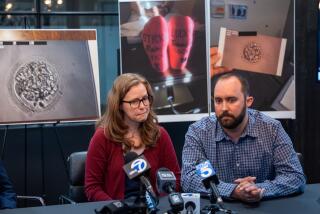Custody of Stored Embryos Disputed in Divorce Trial
MARYVILLE, Tenn. â In a divorce trial that began Monday, the judge must decide whether seven frozen embryos should go the husband, who doesnât want children now, or to the wife, who cannot conceive naturally.
In his lawsuit seeking a divorce from Mary Sue Davis, 28, Junior Lewis Davis, 30, asked that she be barred from using any of the seven fertilized eggs without his consent. She contends she should have sole custody of the embryos because they represent her best chance of having a child.
âThe question of how we classify these embryos is vital,â Jay Christenberry, Mary Sue Davisâ attorney, said in his opening statement. âWhile the coupleâs rights are important, there are other rights we must consider.â
Blount County Circuit Judge W. Dale Young must decide if the embryos deserve consideration as potential children and should be treated as such, or if they are property for the purposes of the divorce settlement.
The case is thought to be the first of its type in the United States.
A medical ethics expert testified Monday that the embryos deserve special respect, but should not be regarded as having the same rights as living persons.
John A. Robertson, a law professor at the University of Texas, said there is broad consensus that âthe pre-embryo at this stage is not a legal subject.â
âBecause it represents potential life, it deserves a special respect above that accorded any other human tissue, but not the respect of a person,â he said.
Robertson said he helped to draft the ethical guidelines the American Fertility Society follows in the technology.
Robertson described the embryos--eggs removed from Mary Sue Davis and fertilized with Junior Davisâ sperm in a laboratory procedure, then frozen and stored late last year--as âundifferentiated cells.â
âItâs not even clear that you have a unique individual at this stage. There is no clearly defined biological individual,â he told the court.
Robertson testified that the case should be decided in favor of the one who would be hurt most by losing, Junior Davis. He said Mary Sue Davis can try in vitro fertilization again if she loses, and that would be less of a burden on her than unwanted fatherhood would be for her husband.
In his opening statement, Christenberry said the embryos are âpre-bornâ children with rights of their own. A central question in the case is âwhere life begins,â he said.
Robertson said that fertilization âmight be a first step,â but that there are several other, equally vital steps in the process of bearing a child.
Earlier testimony indicated that the embryos, which are stored at minus 180 degrees Centigrade in a Knoxville hospital, have developed no more than eight cells each.
More to Read
Sign up for Essential California
The most important California stories and recommendations in your inbox every morning.
You may occasionally receive promotional content from the Los Angeles Times.










